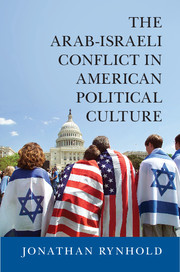Book contents
- Frontmatter
- Dedication
- Contents
- Acknowledgments
- Introduction
- 1 Like U.S.: American Identification with Israel
- Part I Party and Ideology
- 2 Republicans, Conservatives and the Right: The Surge in Support for Israel
- 3 Democrats, Liberals, and the Left: Rising Criticism of Israel
- Part II Protestants
- Part III Jews
- Notes
- Bibliography
- Index
3 - Democrats, Liberals, and the Left: Rising Criticism of Israel
Published online by Cambridge University Press: 05 February 2015
- Frontmatter
- Dedication
- Contents
- Acknowledgments
- Introduction
- 1 Like U.S.: American Identification with Israel
- Part I Party and Ideology
- 2 Republicans, Conservatives and the Right: The Surge in Support for Israel
- 3 Democrats, Liberals, and the Left: Rising Criticism of Israel
- Part II Protestants
- Part III Jews
- Notes
- Bibliography
- Index
Summary
This explosion of violence would be totally understandable if the Palestinians had no alternative. But … it came in the context of a serious Israeli peace overture, which Mr. Arafat has chosen to spurn. That’s why this is Arafat’s war. That’s its real name.
—Thomas Friedman, October 2001Israel’s continued control and colonization of Palestinian land have been the primary obstacles to a comprehensive peace agreement in the Holy Land.
—Jimmy Carter, 2006Introduction
Since Vietnam, and especially since the 2003 Iraq War, American opinion over foreign policy has grown more polarized along partisan and ideological lines, with Democrats and liberals on one side, and Republicans and conservatives on the other. At the same time, Democrats have become increasingly divided among themselves over foreign policy. For a long time both of these divisions bypassed the Arab-Israeli conflict, however this is no longer the case.
This chapter surveys and analyzes liberal, Democratic, and left-wing approaches to the Arab-Israeli conflict. It begins with a look at levels of identification with liberalism among the general public and within the Democratic Party, followed by a brief survey of the development of liberal attitudes to Israel prior to 1990. It then focuses on three elite approaches to the conflict: robust liberal internationalism, which is the most supportive of Israel while also promoting a two-state solution; the approach of dovish Democrats who favor an evenhanded approach to the conflict; and the progressive-postcolonial approach that sympathizes primarily with the Palestinians. The chapter then goes on to survey liberal narratives of the rise and fall of the peace process from the early 1990s until the end of the first decade of the new millennium through the coverage of the main liberal magazines and columns of a number of leading liberal columnists. Attention then turns to the attitudes of rank-and-file Democrats and liberals. Following this, the chapter briefly demonstrates the impact of liberal approaches on U.S. policy towards the conflict in the Clinton and Obama administrations, as well as among Democrats in Congress. Finally, it is argued that there is a decline in support for Israel over the Palestinians, particularly among the younger generation of liberals.
- Type
- Chapter
- Information
- The Arab-Israeli Conflict in American Political Culture , pp. 58 - 92Publisher: Cambridge University PressPrint publication year: 2015

